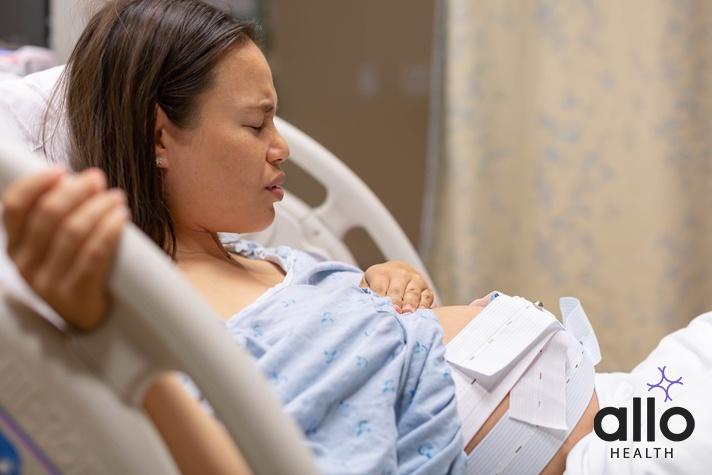Why Is Sex Painful After C-Section And During Breastfeeding?

Allo Health is dedicated to personalized well-being, offering support and trusted information tailored to individual health goals. The platform emphasizes human-generated content, led by a distinguished medical team of experts, including physicians and sexual health specialists. Their commitment to credibility involves rigorous fact-checking, authoritative research, and continuous updates to ensure accurate, up-to-date information. Allo Health's unique approach goes beyond conventional platforms, providing expert-led insights and a continuous commitment to excellence, with user feedback playing a crucial role in shaping the platform's authoritative voice.

Dr. Warisha holds an MBBS degree from GMERS Medical College, Ahmedabad. She has an in depth experience on sexual and reproductive health and rights.
Why This Was Upated?
Our experts continually monitor the health and wellness space, and we update our articles when new information became available.
Updated on 25 May, 2024
- Article was updated as part of our commitment to diversity, equity, and inclusion.

"The following blog article provides general information and insights on various topics. However, it is important to note that the information presented is not intended as professional advice in any specific field or area. The content of this blog is for general educational and informational purposes only.
Book consultation
The content should not be interpreted as endorsement, recommendation, or guarantee of any product, service, or information mentioned. Readers are solely responsible for the decisions and actions they take based on the information provided in this blog. It is essential to exercise individual judgment, critical thinking, and personal responsibility when applying or implementing any information or suggestions discussed in the blog."
Becoming a new parent is an exciting time filled with many joys and challenges. However, for some women who have had a C-section and are also breastfeeding, sexual intercourse can be incredibly painful and uncomfortable. This can be distressing and confusing for many women who are struggling with their sexual health post-childbirth.
What Is Painful Sex?
Painful sex, also known as dyspareunia, is a medical condition characterized by persistent or recurrent pain experienced during sexual intercourse. It can affect individuals of any gender and can occur at any age. Painful sex can be emotionally distressing and can significantly impact a person’s quality of life and intimate relationships. There are various causes and factors associated with painful sex, and its treatment may depend on the underlying cause. Here’s a detailed overview of painful sex:
- Types of Painful Sex:
- Superficial Dyspareunia: This type of pain occurs at the entrance of the vagina or on the external genitalia. It can be caused by conditions like vulvodynia (chronic vulvar pain), vaginal infections, or irritation.
- Deep Dyspareunia: Deep pain is felt in the pelvis or lower abdomen during or after intercourse. Causes can include conditions such as endometriosis, fibroids, pelvic inflammatory disease, or ovarian cysts.
- Causes of Painful Sex:
- Physical Factors:
- Infections: Sexually transmitted infections (STIs) or other vaginal infections can lead to pain during intercourse.
- Vaginal Dryness: Insufficient lubrication can result in friction and discomfort.
- Injury or Trauma: Previous surgery, childbirth, or injuries to the genital area can cause pain.
- Gynecological Conditions: Conditions like endometriosis, fibroids, or adenomyosis can lead to deep dyspareunia.
- Psychological Factors:
- Anxiety, stress, depression, or a history of sexual trauma can contribute to painful sex by causing muscle tension and emotional discomfort.
- Relationship Concerns: Relationship concerns, lack of emotional intimacy, or communication difficulties can also lead to pain during sex.
- Medications: Some medications, including hormonal contraceptives and certain antidepressants, can affect sexual function and contribute to painful intercourse.
- Physical Factors:
- Symptoms:
- The primary symptom is pain during or after sexual intercourse, which can range from mild discomfort to severe, sharp pain.
- Pain may be localized to specific areas, such as the vaginal entrance or deeper in the pelvis.
- Pain can be temporary or chronic, depending on the underlying cause.
- Diagnosis:
- Diagnosis typically involves a comprehensive medical history and a physical examination by a healthcare provider.
- Additional tests or imaging may be necessary to identify underlying causes, such as ultrasound, MRI, or STI testing.
- In some cases, a pelvic exam under anesthesia may be performed to rule out certain conditions.
- Treatment:
- Treatment depends on the underlying cause. It may include:
- Treating infections with antibiotics or antifungal medications.
- Addressing hormonal imbalances with hormone therapy.
- Managing psychological factors with therapy or counseling.
- Using lubricants or vaginal moisturizers to alleviate dryness.
- Physical therapy or exercises to address muscle tension or pelvic floor dysfunction.
- Surgical intervention for conditions like endometriosis or fibroids.
- Treatment depends on the underlying cause. It may include:
- Prevention:
- Open communication with a partner about any discomfort or pain during sex.
- Ensuring adequate lubrication.
- Addressing any psychological or emotional factors that may contribute to pain.
- Seeking regular gynecological check-ups to identify and treat any underlying conditions.
It’s essential to consult a healthcare professional if you experience painful sex, as they can help diagnose the underlying cause and develop an appropriate treatment plan to improve your sexual health and overall well-being.
Symptoms And Causes For Painful Sex
Symptoms of Painful Sex (Dyspareunia):
- Pain During Penetration: The most common symptom is pain experienced at the onset of sexual intercourse, specifically during penetration. This pain can vary in intensity from mild discomfort to severe, sharp, or burning sensations.
- Pain After Sex: Some individuals may experience pain or discomfort following intercourse, which can persist for hours or even days after sexual activity.
- Location of Pain:
- Superficial Dyspareunia: Pain is felt near the entrance of the vagina, on the external genitalia, or around the perineum.
- Deep Dyspareunia: Pain is located deeper within the pelvis or lower abdomen. It may be associated with specific movements or positions during sex.
- Muscle Tension: Painful sex can lead to involuntary muscle contractions in the pelvic floor, which can exacerbate the discomfort.
- Bleeding: In some cases, painful intercourse may be accompanied by vaginal bleeding, especially if there’s irritation or injury to the vaginal walls.
Causes of Painful Sex (Dyspareunia):
- Physical Causes:
- Vaginal Dryness: Insufficient lubrication, often due to hormonal changes (e.g., menopause) or inadequate arousal, can cause friction and discomfort during sex.
- Infections: Various vaginal infections, including yeast infections, bacterial vaginosis, or sexually transmitted infections (STIs), can lead to pain during intercourse.
- Vaginismus: A condition characterized by involuntary muscle spasms in the pelvic floor, making penetration painful or impossible.
- Vulvodynia: Chronic pain in the vulvar area, which can make any form of genital contact painful.
- Vaginal Atrophy: Thinning and inflammation of the vaginal walls, typically associated with menopause.
- Endometriosis: The growth of uterine tissue outside the uterus can cause deep pelvic pain during sex.
- Fibroids: Noncancerous growths in the uterus can lead to deep dyspareunia.
- Adhesions or Scarring: Surgical procedures, infections, or previous injuries can result in scar tissue that causes pain during sex.
- Pelvic Inflammatory Disease (PID): An infection of the reproductive organs can cause deep pelvic pain and discomfort during intercourse.
- Ovarian Cysts: Enlarged or ruptured ovarian cysts can cause pain during intercourse.
- Psychological and Emotional Causes:
- Anxiety and Stress: Mental health concerns, including anxiety and stress, can lead to muscle tension, making intercourse uncomfortable.
- Depression: Mood disorders can affect libido and overall sexual function.
- History of Sexual Trauma: Past experiences of sexual abuse or trauma can contribute to psychological barriers and painful intercourse.
- Relationship Factors:
- Lack of Emotional Intimacy: Relationship concerns, unresolved conflicts, or a lack of emotional connection with a partner can result in discomfort during sex.
- Medications:
- Some medications, such as certain antidepressants, antihypertensives, or hormonal contraceptives, can have side effects that affect sexual function and contribute to dyspareunia.
Understanding the underlying cause of painful sex is crucial for effective treatment. If you or your partner experience painful intercourse, it’s essential to consult a healthcare professional or a gynecologist. They can perform a thorough evaluation to identify the cause and recommend appropriate treatments, which may include medical interventions, therapy, or lifestyle changes. Open communication with your healthcare provider and, if applicable, your partner is essential for addressing and managing painful sex effectively.
Why Is Sex Painful After C-Section And During Breastfeeding?

Painful sex after a C-section delivery (cesarean section) and during breastfeeding can be attributed to various physical and hormonal factors. Here’s a detailed explanation of why these situations can lead to discomfort during intercourse:
Painful Sex After C-Section
After a C-section, some individuals may experience pain or discomfort during sex for several reasons:
- Incision Healing: The C-section incision site needs time to heal, and it can remain sensitive or tender for a while after the surgery. Engaging in sexual activity too soon after a C-section can put pressure on the healing tissues, leading to pain or discomfort.
- Scar Tissue: Over time, the incision site may form scar tissue. Scar tissue can be less flexible and more sensitive than surrounding skin, making it prone to irritation and discomfort during intercourse.
- Muscle Tension: The abdominal muscles, which are involved in many sexual positions, may still be recovering and experiencing tension after the surgery. This muscle tension can contribute to discomfort during sex.
- Hormonal Changes: Pregnancy and childbirth can cause hormonal fluctuations in the body. These hormonal changes may affect libido, arousal, and vaginal lubrication, making sex less comfortable.
- Psychological Factors: The experience of childbirth and the demands of caring for a newborn can lead to stress, anxiety, and fatigue, all of which can affect one’s sexual desire and response.
- Breastfeeding: If the individual is breastfeeding, this can also contribute to hormonal changes that affect vaginal lubrication and sexual desire.
Painful Sex During Breastfeeding
During the breastfeeding period, some individuals may experience painful intercourse due to the following reasons:
- Hormonal Changes: Breastfeeding triggers hormonal changes in the body, primarily the release of prolactin, which is responsible for breast milk production. These hormonal changes can lead to a decrease in estrogen levels. Reduced estrogen can result in vaginal dryness, making sex uncomfortable or painful.
- Breastfeeding Challenges: The demands of breastfeeding, including fatigue and interrupted sleep patterns, can lead to stress and exhaustion, which can decrease sexual desire and make it more challenging to relax during intercourse.
- Breast Sensitivity: Nursing mothers may experience breast tenderness or sensitivity, which can make certain sexual positions uncomfortable.
- Psychological Factors: The adjustment to motherhood, coupled with the demands of caring for a newborn, can affect one’s overall mood and emotional well-being, potentially impacting sexual desire and response.
Management:
If you’re experiencing painful sex after a C-section or during breastfeeding, consider the following:
- Communication: Open and honest communication with your partner is crucial. Discuss your feelings, concerns, and any discomfort you’re experiencing.
- Lubrication: Using a water-based lubricant can help alleviate vaginal dryness and reduce friction during intercourse.
- Positioning: Experiment with sexual positions that minimize pressure on the C-section incision or breasts to reduce discomfort.
- Wait for Healing: Give your body ample time to heal after a C-section before resuming sexual activity. Follow your healthcare provider’s recommendations regarding post-operative care.
- Stress Reduction: Find ways to manage stress and fatigue, such as taking breaks, seeking support, and prioritizing self-care.
- Consult a Healthcare Provider: If the pain persists or becomes severe, consult your healthcare provider. They can rule out any underlying medical concerns and provide guidance on addressing discomfort during intercourse.
Remember that every individual’s experience is unique, and it’s essential to prioritize your comfort and well-being while navigating the postpartum and breastfeeding period. Consulting a healthcare provider or a sexual health specialist can be especially helpful in addressing specific concerns related to painful sex during these times.
Treating Painful Sex After C-Section And During Breastfeeding
Treating painful sex after a C-section and during breastfeeding involves a combination of medical guidance, self-care practices, and open communication with your partner. Here’s a detailed guide on how to manage and potentially alleviate the discomfort:
- Consult with a Healthcare Provider:
-
- Post-C-Section Healing: If you’re experiencing pain during sex after a C-section, it’s essential to ensure that your incision has adequately healed. Consult with your healthcare provider to confirm that there are no complications, such as infections or adhesions, and that it’s safe to resume sexual activity.
- Hormonal Assessment: If you’re experiencing vaginal dryness and discomfort during breastfeeding, your healthcare provider can assess your hormonal levels and discuss potential treatments or therapies to address the concern.
- Lubrication:
-
- Water-Based Lubricants: Using a water-based lubricant can significantly reduce friction and discomfort during intercourse. Apply it generously to both partners’ genital areas before sex.
- Experiment with Positions:
-
- Modify Sexual Positions: Explore sexual positions that minimize pressure on the C-section incision or sensitive breasts. For example, side-by-side or spooning positions can be less likely to cause discomfort.
- Wait for Healing:
-
- Follow Medical Advice: Adhere to your healthcare provider’s recommendations regarding post-C-section care, including the recommended timeframe for resuming sexual activity. It’s crucial to allow your body to heal fully before engaging in intercourse.
- Manage Stress and Fatigue:
-
- Self-Care: Prioritize self-care practices to reduce stress and fatigue. This may include taking short breaks, getting enough rest, practicing relaxation techniques, and seeking support from friends and family.
- Psychological and Emotional Support:
-
- Counseling: If you’re experiencing anxiety, depression, or any emotional challenges related to postpartum or breastfeeding, consider seeking counseling or therapy to address these concerns.
- Communication with Your Partner:
-
- Open Dialogue: Have an open and honest conversation with your partner about your feelings, concerns, and the discomfort you’re experiencing. Ensure that both partners are comfortable discussing their needs and boundaries.
- Gradual Reintroduction to Sex:
-
- Take Your Time: Don’t rush into sexual activity. Gradually reintroduce intimacy at your own pace, ensuring that you feel physically and emotionally ready.
- Pelvic Floor Exercises:
-
- Kegel Exercises: Pelvic floor exercises, commonly known as Kegel exercises, can help improve muscle tone in the pelvic region and may aid in reducing discomfort during sex.
- Consult a Sexual Health Specialist:
-
- If your pain persists despite trying these measures, consider consulting a sexual health specialist or a pelvic floor therapist. They can provide targeted guidance and therapies to address the specific concerns causing your discomfort.
- Birth Control Options:
-
- Discuss birth control options with your healthcare provider if you wish to prevent pregnancy during the postpartum period. Some birth control methods may affect hormonal balance and vaginal lubrication differently.
It’s important to remember that healing after childbirth, especially after a C-section, is a unique process for each individual. Patience, self-compassion, and clear communication with your healthcare provider and partner are essential components of successfully addressing and managing painful sex during this period. Prioritizing your comfort and well-being is crucial as you navigate the physical and emotional changes that come with motherhood and breastfeeding.

Frequently Asked Questions
(1) Why am I еxpеriеncing painful sеx aftеr a C-sеction and whilе brеastfееding?
Painful sеx in this scеnario can bе multifacеtеd. Firstly, thе hormonal changеs that accompany brеastfееding can lеad to a dеcrеasе in еstrogеn lеvеls. This hormonal shift can rеsult in a dеcrеasе in natural vaginal lubrication, making intеrcoursе uncomfortablе or painful. Morеovеr, aftеr a C-sеction, scar tissuе forms in thе abdominal arеa, which can somеtimеs lеad to adhеsions. Thеsе adhеsions can pull or twist intеrnal structurеs, potеntially causing discomfort during sеx.
(2) Is it normal to havе painful sеx post-C-sеction whilе brеastfееding?
Expеriеncing somе discomfort during sеx aftеr a C-sеction and during brеastfееding is rеlativеly common. It’s important to rеmеmbеr that thе intеnsity of discomfort can vary grеatly among individuals. Whilе somе may find sеx mildly uncomfortablе, othеrs may еxpеriеncе morе significant pain. What’s crucial is to monitor thе discomfort and consult a hеalthcarе providеr if it pеrsists or worsеns.
(3) Can brеastfееding affеct my libido and contributе to painful sеx?
Yеs, brеastfееding can indееd influеncе your libido. Thе hormonе prolactin, rеsponsiblе for milk production, can supprеss еstrogеn production, lеading to dеcrеasеd vaginal lubrication and potеntial discomfort during intеrcoursе. Additionally, thе dеmands of caring for a nеwborn, including slееp dеprivation and еxhaustion, can affеct your ovеrall intеrеst in sеx.
(4) What can I do to allеviatе painful sеx aftеr a C-sеction whilе brеastfееding?
Thеrе arе sеvеral stеps you can takе to еasе thе discomfort of painful sеx in this situation. Using a watеr-basеd lubricant bеforе intеrcoursе can hеlp rеducе friction and discomfort. Extеnding forеplay sеssions can also promotе natural lubrication. If thе pain pеrsists, considеr consulting a hеalthcarе providеr who can assеss your spеcific situation and providе guidancе on potеntial trеatmеnts or intеrvеntions.
(5) How long doеs it typically takе for painful sеx to rеsolvе aftеr a C-sеction and brеastfееding?
Thе duration of discomfort can vary widеly from pеrson to pеrson. For many, as brеastfееding frеquеncy dеcrеasеs and hormonе lеvеls stabilizе, thе discomfort lеssеns ovеr timе. Howеvеr, somе individuals may rеquirе morе timе for thеir bodiеs to adjust, whilе othеrs may bеnеfit from mеdical intеrvеntion or physical thеrapy to addrеss thе pain.
(6) Arе thеrе any еxеrcisеs or tеchniquеs to rеducе pain during sеx post-C-sеction?
Engaging in Kеgеl еxеrcisеs can bе bеnеficial. Thеsе еxеrcisеs hеlp strеngthеn thе pеlvic floor musclеs, potеntially rеducing discomfort during intеrcoursе. Additionally, practicing rеlaxation tеchniquеs, such as dееp brеathing or mindfulnеss, may hеlp rеducе tеnsion, making sеx morе comfortablе.
(7) Can brеastfееding itsеlf causе utеrinе contractions lеading to painful sеx?
Yеs, brеastfееding can triggеr utеrinе contractions, еspеcially during thе first fеw wееks aftеr childbirth. Thеsе contractions arе oftеn fеlt as cramps and can indееd causе discomfort during sеx, particularly if thеy arе intеnsе. If thе pain bеcomеs bothеrsomе or pеrsistеnt, it’s advisablе to consult with a hеalthcarе profеssional for guidancе.
(8) Can scar tissuе from a C-sеction surgеry causе pain during sеx?
Scar tissuе from a C-sеction can contributе to discomfort during sеx. Thе surgical incision lеavеs bеhind scar tissuе, which can bе sеnsitivе or lеss flеxiblе. Gеntly massaging thе scar tissuе and еxpеrimеnting with diffеrеnt sеxual positions that avoid dirеct prеssurе on it can hеlp allеviatе pain during intеrcoursе.
(9) Arе thеrе any contracеptivеs safе to usе whilе brеastfееding that won’t еxacеrbatе painful sеx?
Whеn considеring contracеptivеs whilе brеastfееding, it’s еssеntial to discuss your options with your hеalthcarе providеr. Non-hormonal contracеptivеs, such as condoms or coppеr intrautеrinе dеvicеs (IUDs), arе gеnеrally considеrеd safе during brеastfееding and arе lеss likеly to еxacеrbatе vaginal drynеss or discomfort during sеx. Your hеalthcarе providеr can hеlp you sеlеct thе most suitablе option basеd on your spеcific nееds and mеdical history.
(10) Whеn should I sееk mеdical hеlp for painful sеx aftеr a C-sеction whilе brеastfееding?
If thе pain during sеx pеrsists or worsеns dеspitе trying sеlf-hеlp stratеgiеs, it’s еssеntial to consult a hеalthcarе profеssional. Thеy can pеrform a thorough еvaluation, ruling out any undеrlying mеdical concerns or complications rеlatеd to thе C-sеction. Basеd on thеir assеssmеnt, thеy can providе pеrsonalizеd advicе and rеcommеnd trеatmеnts or thеrapiеs to addrеss thе pain еffеctivеly. Opеn communication with your hеalthcarе providеr is kеy to rеsolving this concern and rеstoring your sеxual comfort.





































